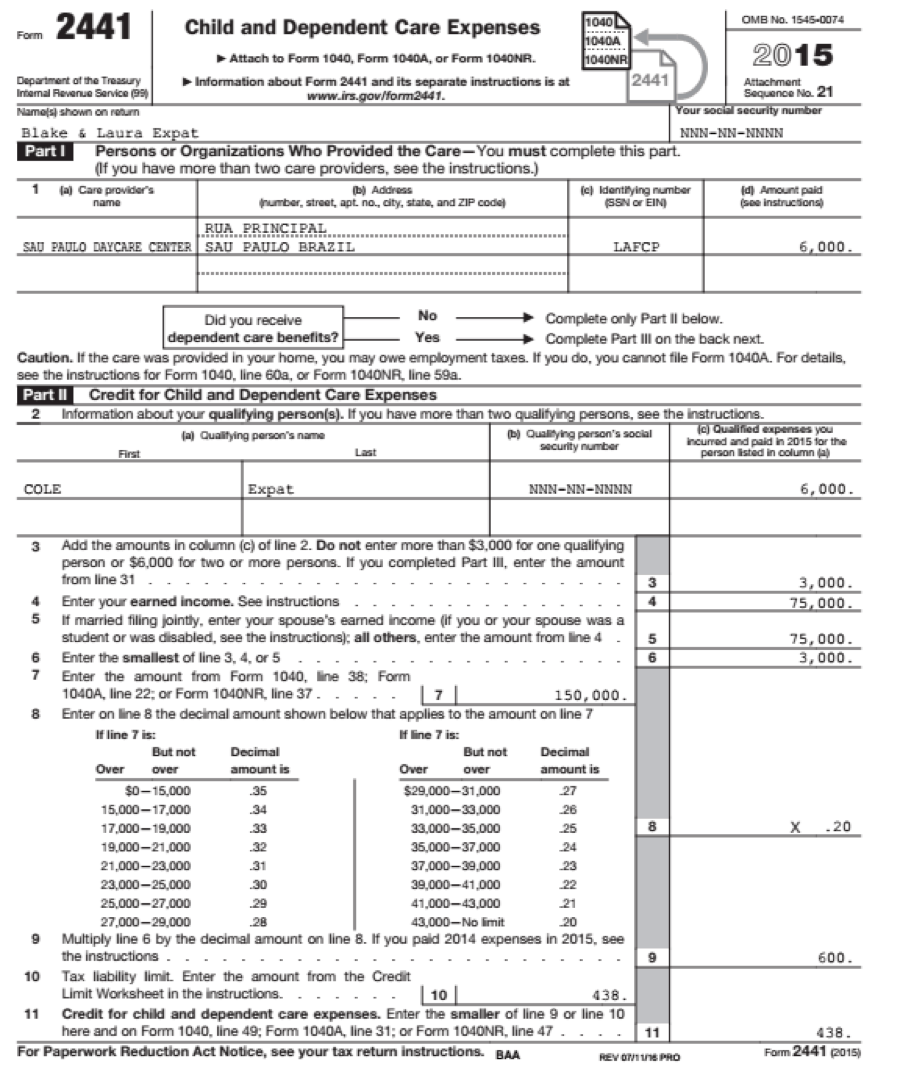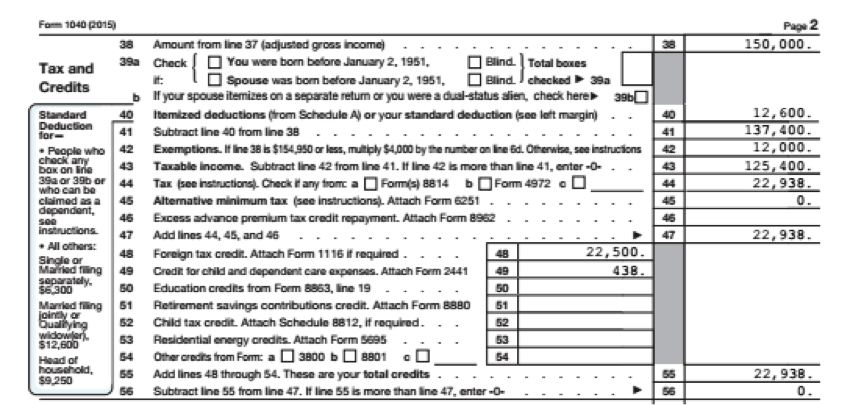The Child Care Credit and Your US Expat Tax Return When Abroad

Saving money on your US expat tax return sounds good, doesn’t it? Luckily, there are ways to do just that – by taking advantage of the credits, deductions and exclusions available to US expats. If you happen to have children, you probably know the costs of childcare can be significant. But what you may not have realized is that you may be able to lower your US expat taxes if you’ve paid a person or company to care for your child while you worked or attended school. Here’s what to know about the Child Care Credit.
Get the Details on the Child Care Credit When Abroad
Officially titled the Child and Dependent Care Credit, this credit helps reduce your US expat tax return by providing a dollar-for-dollar reduction in your actual tax owed to the IRS. It is different than a deduction, which lowers your taxable income before your tax is calculated. For example, if you’re in the 25% tax bracket, a $100 deduction would reduce your tax bill by $25, but a $100 credit would reduce your tax bill by $100. This is a non-refundable tax credit, which means it cannot reduce your tax bill below zero.
If you paid for childcare expenses for a qualified child in order for you to work or look for work (and your spouse, if filing jointly), then you may be able to take this credit.
Requirements for the Child Care Credit
When it comes to taking advantage of this credit, there are certain criteria that must be met on your US expat tax return, including:
- The child must be your dependent, aged 12 or under. Others who are physically or mentally incapable of caring for themselves may be considered a qualified individual regardless of age, if you claim them on your US tax return as a dependent.
- You must have earned income on your US expat tax return. If you’re filing a joint return, you and your spouse must both have earned income or be a full-time student.
- You can’t use expenses paid to your spouse (or parent of the dependent) or to another child unless they are aged 19 or older. Essentially this means, you can’t claim amounts paid to the child’s other parent or to a teenage sibling babysitter.
- Your tax filing status cannot be Married Filing Separately.
- Your child or dependent must have lived with you for over half the year; however, there are some exceptions for dependents that live far away from home due to divorce, illness and school.
- You will need to list the name, address, amount paid and US tax ID number of the childcare provider on your tax return. Note that foreign providers don’t need a US tax ID.
Understanding Earned Income
Your earned income is any that you receive from wages, salaries, employee compensation or net profits from self-employment. It doesn’t include income from interest, dividends or capital gains.
The Child Care Credit can get tricky for US expats, since in order to calculate it, you must show earned income on your US expat tax return. Generally, US expats use the Foreign Earned Income Exclusion (FEIE) to save money on expat taxes, which excludes earned income on the return for the purpose of lowering your taxable income. Any earned income on your return after claiming the FEIE can then be utilized to calculate the Child Care Credit.
This can cause a dilemma for many expats: if all of your income is excluded using the FEIE, you won’t be able to claim the Child Care Credit on your expat tax return. And if you don’t exclude your income using the FEIE, it’s possible that your tax credits won’t cover the taxes generated by your income.
The Nanny Tax Deduction and Other Considerations
When it comes to your expat taxes, there are so many intricacies that you’ll need to consider when figuring your US expat tax return. These include:
- Will you claim the Foreign Tax Credit? Your tax return must be calculated in a specific way, and there is a pecking order to claim tax credits. The Foreign Tax Credit (FTC) will come before the Child Care Credit, so if your taxes will be reduced to zero by the FTC, you won’t be able to also take the Child Care Credit. If you aren’t using the FTC, or if it only excludes part of your taxes, you can take the Child Care Credit.
- Will you claim the Foreign Earned Income Exclusion? If you need to show that you have earned income on your US expat tax return, you have the option to choose not to claim the Foreign Earned Income Exclusion (FEIE) and take the Child Care Credit (plus any other credits) to help reduce your taxes. It’s important to know that you may open yourself up to move more than a single year of tax if you go this route. If you’ve taken the FEIE in the previous year and then choose not to use it on your current tax return, you won’t have the ability to claim it for 5 years. There are certain ways to claim a partial year FEIE on your return, which will leave you with some earned income to calculate the Child Care Credit, but you should consult with a tax professional to determine your best options.
In some cases, the Child Care Credit could help you recoup up to 35% of your child care expenses as a tax credit on your US expat tax return, but there are certain considerations you’ll need to make as an expat. Taking the time to consider all of the ways you can compile your expat taxes with the FEIE and other tax credits, including the Nanny Tax Deduction, could give you the chance to claim more and pay less out of your pocket!
Foreign Provider and Child Care Example: Blake and Laura Expat
Blake and Laura expat were two Montana natives who moved to Brazil to pursue their dreams of professional Samba dancing. Shortly after arriving, they had a son, Cole. The dancers have done well in Brazil, earning the equivalent of $75,000 each. They put Cole in a daycare center during the day while completing their rehearsals. They paid the equivalent of $6,000 during the year for daycare expenses, and combined, they paid the equivalent of $22,500 in taxes to the Brazilian government. They want to take the Child and Dependent Care Tax Credit.

Due to Blake and Laura’s income, they are allowed to take 20% of their qualifying expenses, up to the one child limit of $3,000. That would ordinarily come out to $600, but in this instance, it’s only $438.
Remember above when we mentioned the pecking order of the tax credits? Since Blake and Lauren also paid taxes to the Brazilian government, they are entitled to a Foreign Tax Credit. Here’s how that looks on the second page of their Form 1040.
Without any credits, they would have owed $22,938 to the IRS. However, since they paid taxes to a foreign government on their foreign income, they are entitled to a Foreign Tax Credit. In this case, they get to take $22,500 as a Foreign Tax Credit. That means they would have owed $438, if not for the Child and Dependent Care Credit. Since the remaining tax liability is $438, and this is a non-refundable credit, they can only take a $438 credit instead of $600.
To learn more about the expat tax process and the different credits, deductions and exclusions available to you, check out our tax guide for Americans working overseas.
Not Sure if the Child Care Credit is the Best Way to Save on Your Taxes?
Our expat-expert CPAs and IRS Enrolled Agents can help by reviewing your specific tax situation and determining the method that will help you save the most on your US expat tax return. Get started on your expat taxes today.
Use our simple excel calculator to get an estimate of how the foreign earned income exclusion will save you money. It will make your day!




